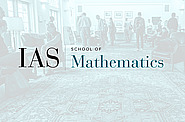2023-2024 Seminars
Feb
26
2024
Computer Science/Discrete Mathematics Seminar I
Stability and Learning in Strategic Games
Éva Tardos
11:00am|Simonyi 101 and Remote Access
Feb
20
2024
Computer Science/Discrete Mathematics Seminar II
Analyzing the Max Entropy Algorithm for TSP
10:30am|Simonyi Hall 101 and Remote Access
Feb
13
2024
Computer Science/Discrete Mathematics Seminar II
Reconstruction on Trees and Hypertrees
10:30am|Simonyi Hall 101 and Remote Access
Feb
12
2024
Computer Science/Discrete Mathematics Seminar I
Advances in Parallel and Private Stochastic Optimization from Ball Acceleration
Kevin Tian
11:00am|Simonyi 101 and Remote Access
Feb
06
2024
Computer Science/Discrete Mathematics Seminar II
An Exponential Lower Bound on Three Query, Linear Locally Correctable Codes
10:30am|Simonyi Hall 101 and Remote Access
Feb
05
2024
Computer Science/Discrete Mathematics Seminar I
Expanding the Reach of P Not Equal to NP: the Minimum Circuit Size Problem with a Random Oracle is NP-hard
Rahul Ilango
11:00am|Simonyi 101 and Remote Access
Jan
30
2024
Computer Science/Discrete Mathematics Seminar II
Omniprediction and Multigroup Fairness
Parikshit Gopalan
10:30am|Simonyi Hall 101 and Remote Access
Jan
29
2024
Computer Science/Discrete Mathematics Seminar I
The Tree Evaluation Problem: Context and Recent Results
Ian Mertz
11:00am|Simonyi 101 and Remote Access
Jan
23
2024
Computer Science/Discrete Mathematics Seminar II
Online Discrepancy Minimization
10:30am|Simonyi Hall 101 and Remote Access
Jan
22
2024
Computer Science/Discrete Mathematics Seminar I
Marton's Conjecture, aka the Polynomial Freiman--Ruzsa Conjecture
Frederick Manners
11:00am|Simonyi 101 and Remote Access
